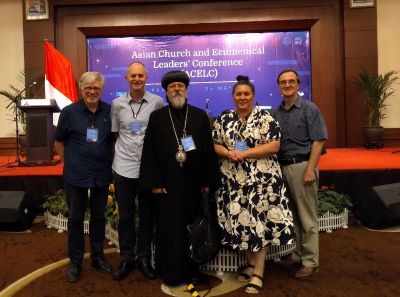‘How is it that we hear’. (cf Acts 2:8)
 |
|
|
Above: Australasian participants at the Christian Conference of Asia's (CCA's) Asian Church and Ecumenical Leaders' Conference (ACELC) in Jakarta, Indonesia. (L-R) NCCA's Rev John Gilmore with Rev Michael Hughes (Anglican Church in New Zealand and Polynesia – General Secretary) Bishop Daniel (Coptic Orthodox Church in Australia), Rev Tara Tautari (Methodist Church of New Zealand – General Secretary) and Rev Terence Corkin, UCA (CCA Executive Committee member). |
|
Three important points of focus overlap later in May. The Week of Prayer for Christian Unity commences on May 21 and concludes on May 28.
National Reconciliation Week commences on May 27 the anniversary of when 90% of Australian voters to include Aboriginal and Torres Strait Islander peoples in the census and gave the Australian Government the power to make laws for Australia’s First peoples. It concludes on the anniversary of the Mabo decision (June 3). In the middle of the two is the day of Pentecost.
National Reconciliation Week started 30 years ago as the Week of Prayer for Reconciliation with a deep desire for meaningful, just and lasting (re)conciliation Australia’s Indigenous peoples. The legacy of invasion and dislocation coupled with decades of disruption to cultural, family and community life has left deep and ongoing trauma for many. Conciliation and justice are an ongoing priority and Australia will never be whole without it.
One cannot escape the reality that unity in church life, while spoken of, remains an ongoing journey. The clarity of our Christian witness is compromised when people face a decision about which church community they embrace. The simplest expression of unity, an affirmation that we need each other can create new pathways. In unity we affirm that we have more in common than that which separates us.
We do not need top-down plans for (re)conciliation, or for unity. What is needed is a deep shift in our spirit and heart (individually and collectively).
The deep mystery of the Day of Pentecost is captured in a question asked by those outside the room. They exclaim – ‘these people are Galileans’ and ask - ‘How is it that we hear, each of us in our own native language?’ (Acts 2:8). It seems that those listening were attentive to the environment around them and open to what was happening.
Unity and reconciliation begin with listening, being open and welcoming the other to set the agenda. Such a process leads to a deep hearing of the other, even when what is said may be hard to accept or agree with. Such listening may be uncomfortable and will lead us into deep change.
As we pause and focus in these celebrations may our prayer be that we listen, and that our listening leads us to change knowing that truth that all voices are important and that we need each other.
Rev John Gilmore
NCCA President












